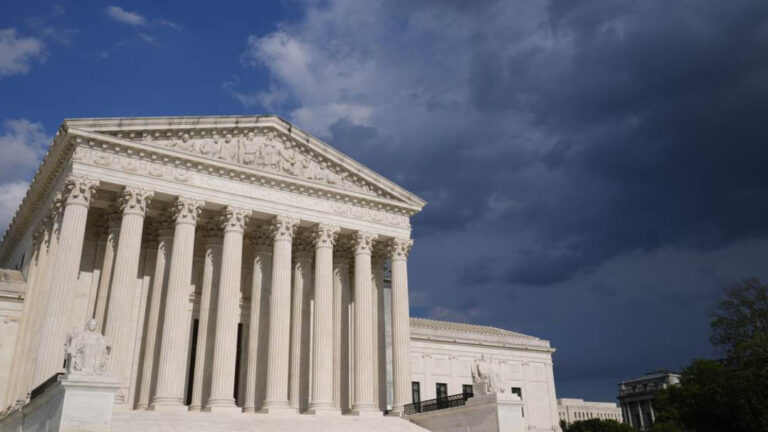President (and Supreme Court Chief Justice) William Howard Taft once said “presidents come and go, but the Supreme Court goes on forever.”
But not if Joe Biden has his way. Indeed, both the president and Court as we know it could be gone.
In a failed attempt to save his nomination, Biden offered to “reform” the Court by imposing an 18-year term limit that would jettison the three most senior conservative justices.
With only six months left in his presidency, Biden’s efforts are likely to fail, but, unfortunately, could set the stage for activists under a Harris Administration in seeking to change the Court forever.
For more than 50 years, Biden staunchly refused to play politics with the Supreme Court and support calls for “reforms” from the left of his party.
For a politician who has long been criticized for changing positions with the polls on issues from abortion to criminal justice to gun rights, the Court was one of the few areas of true principle for Biden.
Even though he refused to answer questions on packing the Court in the 2020 election, he ultimately rejected the call as president.
Yet Biden’s final principle fell this month when facing the premature and involuntary end of his candidacy. Faced with being a one-term president, the Supreme Court would have to be sacrificed.
Biden opted for the least of the evils in pushing for term limits rather than court packing.
It was the more popular option for Biden to yield on. Voters have always loved term limits.
The Associated Press-NORC Center for Public Affairs Research found 67% of Americans, including 82% of Democrats and 57% of Republicans, support a proposal to set finite terms for justices.
But there were few law professors and even fewer Democratic members clamoring for term limits until conservatives secured a stable majority on the Court. Then, suddenly, the Court had to be “reformed” without delay.
It is no accident that the first three justices who would term limited off the Court are conservatives: Clarence Thomas (after 33 years on the Court), Chief Justice John Roberts (after 19 years), and Justice Samuel Alito (after 18 years).
Think, however, about the iconic decisions we would have lost with term limits in place. Liberal Justice Williams Douglas’s 36 years on the Court would have literally been cut in half. He would have been kicked off in 1957.
His famous opinions like Griswold v. Connecticut (1965), striking down bans on contraceptives, would not have been written — an ironic result for those seeking limits after the Court’s ruling in Dobbs.
Likewise, liberal icon Ruth Bader Ginsberg’s tenure would have ended in 2011 before she wrote her famous dissent Shelby County v. Holder (2013), defending voting rights.
Anthony Kennedy’s term would have ended in 2011 rather than 2018, before he wrote opinions such as United States v. Windsor, striking down the Defense of Marriage Act.
Obviously, other justices could have written opinions in these cases, but the point is that many justices wrote their best opinions after 18 years on the Court.
Moreover, the Framers clearly wanted these positions as lifetime appointments as an added protection against political pressure or influence.
For more than two centuries, presidents have struggled with the Supreme Court, but none (until now) have attempted to end life tenure on the Court.
Presidents have served as the firewall for the anger and radicalism that has periodically engulfed the Court.
Now President Biden is leading the mob for changing this institution for the first time since its founding.
It is a testament to what I call “an age of rage” in my new book. After years of supporting the Court when it was setting aside conservative precedent, liberals now want the Court changed to dump or dilute the majority.
It is unlikely to end there. After sending Thomas, Roberts, and Alito packing, many want to go further and pack the Court itself.
Democratic leaders such as Sen. Elizabeth Warren (D-Mass.) have called for outright court packing — a proposal that Vice President Kamala Harris has suggested that she might support.
Where Biden is a political opportunist in belatedly joining this movement, Harris is a true believer from the far left.
If she is elected, the Congress is still likely to be closely divided. That will only increase pressure to convert the Court into an alternative avenue for social and political reform.
Harvard professor Michael Klarman warned that all of the plans to change the country were ultimately dependent on packing the court.
With the 2020 election, he stated that Democrats could change the election system to guarantee Republicans “will never win another election.”
Notably, if Biden were to seek this change as a legislative matter without a constitutional amendment, future Congresses could short terms further from 18 to 8 years or even less.
In his speech, Biden declared that he wanted the membership of the Court changed with greater “regularity.”
If Congress has this authority, it could change the occupants of the Court faster than a South Beach timeshare condo.
That is clearly the opposite of what the Framers intended, but Biden insists that these times are different and democracy will only be safeguarded by attacking one of our core stabilizing institutions.
According to the Washington Post, the president made his pledge in a Zoom call to the left-wing Congressional Progressive Caucus, chaired by Rep. Pramila Jayapal (D-Wash.) and co-chaired by Rep. Ilhan Omar (D-Minn.). It did not succeed in resuscitating his candidacy.
The pledge will be dead on arrival with Congress. What is left is a King Lear-like tragedy of a presidency, betrayed by those closest to him, and wandering the land for continued relevance.
History will show a pitiful figure who offered up the Court as the cost of staying in power, only to lose his candidacy and his legacy.
Jonathan Turley is a Fox News Media contributor and the Shapiro professor of public interest law at George Washington University. He is the author of “The Indispensable Right: Free Speech in an Age of Rage.”



